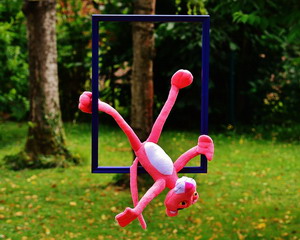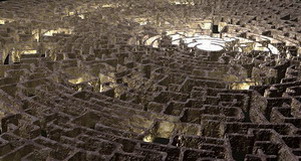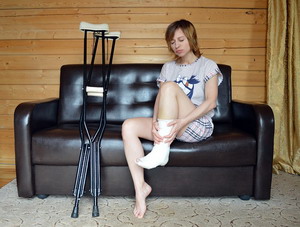 I am not like a normal doctor. I do not work on broken people. In fact, I go to a lot of extra effort testing and diagnosing what is going on with a new patient to determine if something is broken in some way. Because if there is something broken, I refer them out to a normal doctor. When you come to my office, you may think you are broken because you are in pain. But pain does not mean you are broken. Often times really broken patients are in very little pain if any at all. Pain says your system is paying attention to how well things are working and is letting you know when things are out of balance. This is what I work with — getting things back into balance.
I am not like a normal doctor. I do not work on broken people. In fact, I go to a lot of extra effort testing and diagnosing what is going on with a new patient to determine if something is broken in some way. Because if there is something broken, I refer them out to a normal doctor. When you come to my office, you may think you are broken because you are in pain. But pain does not mean you are broken. Often times really broken patients are in very little pain if any at all. Pain says your system is paying attention to how well things are working and is letting you know when things are out of balance. This is what I work with — getting things back into balance.
 Your human body is unbelievably complex. The amount of coordination between these many complex systems to keep things running smoothly is astounding. Because of this, little glitches pop up now and then that we notice as symptoms. These glitches might be in the balance and coordination of the muscles and joints, or it might be in the digestive system, the hormonal system, the immune system, the energy system, the nervous system, with neurotransmitters, and many other systems. There may be too much energy causing tension and inflammation or there may be a deficiency of energy causing under-functioning, or things may just be confused. This is the arena that interests me and therefore what I enjoy working on.
Your human body is unbelievably complex. The amount of coordination between these many complex systems to keep things running smoothly is astounding. Because of this, little glitches pop up now and then that we notice as symptoms. These glitches might be in the balance and coordination of the muscles and joints, or it might be in the digestive system, the hormonal system, the immune system, the energy system, the nervous system, with neurotransmitters, and many other systems. There may be too much energy causing tension and inflammation or there may be a deficiency of energy causing under-functioning, or things may just be confused. This is the arena that interests me and therefore what I enjoy working on.
 Broken things are different. A broken leg is pretty obvious. It needs to be reset and cast to hold everything together while the bone mends. A gunshot wound or stab wound needs to be stitched up to stop the bleeding. A raging infection needs strong medicines to stop the progression. Cancer or diabetes are glitches that have gone way too far, perhaps to the point of needing drugs or surgery. Conditions that the body can not recover from without interventions that override the body’s natural processes are the kinds of things I see as broken. Addressing these engages the skills of medical doctors. They intervene to save your life when your body does not have the ability to function on its own to make repairs. This is certainly valuable, but it is not the kind of doctor I am or want to be.
Broken things are different. A broken leg is pretty obvious. It needs to be reset and cast to hold everything together while the bone mends. A gunshot wound or stab wound needs to be stitched up to stop the bleeding. A raging infection needs strong medicines to stop the progression. Cancer or diabetes are glitches that have gone way too far, perhaps to the point of needing drugs or surgery. Conditions that the body can not recover from without interventions that override the body’s natural processes are the kinds of things I see as broken. Addressing these engages the skills of medical doctors. They intervene to save your life when your body does not have the ability to function on its own to make repairs. This is certainly valuable, but it is not the kind of doctor I am or want to be.
 Why don’t I want to be this kind of doctor? My nature is to be of service and support. To be a good medical doctor you have to take control of what is going on. You literally are in charge of life and death matters. You must believe that you know what is right and best and that the patient knows nothing. I have no desire to be in such a position of power and control. I am not able to fool myself into thinking I know what is best for another person. Our individual needs for different experiences in order to grow up require us to be able to make our own decisions in and for our life. I am not willing to disregard this higher need in order to impose my idea of what is right for another person or their body. My standing assumption is that I do not know what is right. My motto, which is actually on a plaque Ellen made for me, is “Just ask, listen, then act.” The instant I think I know what is going on in a patient’s body, I shut off the asking and listening. I am just acting based on my beliefs. This is where I differ from normal doctors. My stance is that my opinions are irrelevant to the patient’s body. All it cares about is its own beliefs. The patient’s body is what I have to work with if I want to get good results.
Why don’t I want to be this kind of doctor? My nature is to be of service and support. To be a good medical doctor you have to take control of what is going on. You literally are in charge of life and death matters. You must believe that you know what is right and best and that the patient knows nothing. I have no desire to be in such a position of power and control. I am not able to fool myself into thinking I know what is best for another person. Our individual needs for different experiences in order to grow up require us to be able to make our own decisions in and for our life. I am not willing to disregard this higher need in order to impose my idea of what is right for another person or their body. My standing assumption is that I do not know what is right. My motto, which is actually on a plaque Ellen made for me, is “Just ask, listen, then act.” The instant I think I know what is going on in a patient’s body, I shut off the asking and listening. I am just acting based on my beliefs. This is where I differ from normal doctors. My stance is that my opinions are irrelevant to the patient’s body. All it cares about is its own beliefs. The patient’s body is what I have to work with if I want to get good results.
 The authoritarian paradigm for medicine has been dominant for the last 150 years in this country. It works well for what it was originally intended, wartime. When the US government needed a medical corps during the Civil War, they needed docs that could take control and stitch up wounds, and cut off gangrenous legs as needed. This situation is not concerned with patient empowerment and motivation for post visit self-care. An emergency room in any hospital is still very much the same situation. While a patient is bleeding out is not the time to be asking them what they feel is the best choice for themselves. The point is I respect the situational need for the authoritarian approach. However, in my humble opinion, 90% of health situations do not fit this paradigm. Most of the time, health has to be a personal conscious choice in order to be successful.
The authoritarian paradigm for medicine has been dominant for the last 150 years in this country. It works well for what it was originally intended, wartime. When the US government needed a medical corps during the Civil War, they needed docs that could take control and stitch up wounds, and cut off gangrenous legs as needed. This situation is not concerned with patient empowerment and motivation for post visit self-care. An emergency room in any hospital is still very much the same situation. While a patient is bleeding out is not the time to be asking them what they feel is the best choice for themselves. The point is I respect the situational need for the authoritarian approach. However, in my humble opinion, 90% of health situations do not fit this paradigm. Most of the time, health has to be a personal conscious choice in order to be successful.
 In my experience, most of the time, people are not broken — they are simply out of balance. The inner harmony that is required for the amazingly complex being that they are to function, has been lost. The old perspective of Chiropractic is that your bones are out of alignment pressing on nerves causing illness, and you need a Chiropractor to fix you. This is that old broken ideology. But the reality is your bones don’t go out of place by themselves. A bone shifts position because the balance of the many muscles attaching to that bone has become unbalanced. This is not a bone problem. It is a neurologic problem or a muscle metabolism issue. Just pushing a bone around does not address why the bone is shifted. What I do is reprogram the muscles around the joint to produce greater harmony with movement. Similarly, I increase or decrease nerve communication to organs and glands to move those systems back toward balance.
In my experience, most of the time, people are not broken — they are simply out of balance. The inner harmony that is required for the amazingly complex being that they are to function, has been lost. The old perspective of Chiropractic is that your bones are out of alignment pressing on nerves causing illness, and you need a Chiropractor to fix you. This is that old broken ideology. But the reality is your bones don’t go out of place by themselves. A bone shifts position because the balance of the many muscles attaching to that bone has become unbalanced. This is not a bone problem. It is a neurologic problem or a muscle metabolism issue. Just pushing a bone around does not address why the bone is shifted. What I do is reprogram the muscles around the joint to produce greater harmony with movement. Similarly, I increase or decrease nerve communication to organs and glands to move those systems back toward balance.
 The why behind the body systems getting out of balance is almost always patient-driven. Lifestyle choices, diet, play activities, sleep patterns, stress, relationships, posture, work ergonomics, and all sorts of up close and personal reasons are the usual real causes behind a patient’s symptoms. That means that without patient willingness and desire to make different choices, their symptom expression will come right back. I may do a perfect job of rebalancing a person’s body, but their interaction with life will recreate the symptoms within a day or two if they don’t engage with life differently. I have learned this the hard way over the last 40 years. Experience has demonstrated to me why the normal doctor authoritarian approach does not work for normal daily living issues patients come up with. I know it is hard to believe, but most people do not respond well to being told what to do and not do. But I assure you, the biggest complaint normal doctors have about patients is the lack of patient compliance and follow-through with the doctor’s orders.
The why behind the body systems getting out of balance is almost always patient-driven. Lifestyle choices, diet, play activities, sleep patterns, stress, relationships, posture, work ergonomics, and all sorts of up close and personal reasons are the usual real causes behind a patient’s symptoms. That means that without patient willingness and desire to make different choices, their symptom expression will come right back. I may do a perfect job of rebalancing a person’s body, but their interaction with life will recreate the symptoms within a day or two if they don’t engage with life differently. I have learned this the hard way over the last 40 years. Experience has demonstrated to me why the normal doctor authoritarian approach does not work for normal daily living issues patients come up with. I know it is hard to believe, but most people do not respond well to being told what to do and not do. But I assure you, the biggest complaint normal doctors have about patients is the lack of patient compliance and follow-through with the doctor’s orders.
 My belief is that the first step to change is personal empowerment. This is not available if you believe you are broken. When you are broken, your complaint is beyond your ability to do anything about it. That puts you in the position of a needy child – powerless. How can you have the power to change your life to resolve your symptoms if you are convinced that you are broken? You can’t. You are left with two choices, playing out the helpless child role or going into resistance to reclaim your power by refusing to do what the doctor says. Neither of these roles results in your engaging the changes that will ultimately help you.
My belief is that the first step to change is personal empowerment. This is not available if you believe you are broken. When you are broken, your complaint is beyond your ability to do anything about it. That puts you in the position of a needy child – powerless. How can you have the power to change your life to resolve your symptoms if you are convinced that you are broken? You can’t. You are left with two choices, playing out the helpless child role or going into resistance to reclaim your power by refusing to do what the doctor says. Neither of these roles results in your engaging the changes that will ultimately help you.
 This is why I choose a different path. My role is to support and assist you with my skills and knowledge. My job is to tell you that you are not broken and that there are things you can do to support the change you are looking for to resolve your symptoms. Symptoms are not karma punishing you for evil transgressions in some past life. Symptoms are the way your body communicates with you to let you know when something you are doing is not working for your health. Yes, I know we (meaning our EGOs) would all like to be able to do whatever we want without consequence. But life just does not work that way. Everything produces consequences – some good and some unpleasant. Life is about feedback on our participation. One of the basic prime rules of physics — every action produces a reaction. This applies to complex systems like us just as much as simple systems like rocks and water. Life’s reactions are our feedback on our actions.
This is why I choose a different path. My role is to support and assist you with my skills and knowledge. My job is to tell you that you are not broken and that there are things you can do to support the change you are looking for to resolve your symptoms. Symptoms are not karma punishing you for evil transgressions in some past life. Symptoms are the way your body communicates with you to let you know when something you are doing is not working for your health. Yes, I know we (meaning our EGOs) would all like to be able to do whatever we want without consequence. But life just does not work that way. Everything produces consequences – some good and some unpleasant. Life is about feedback on our participation. One of the basic prime rules of physics — every action produces a reaction. This applies to complex systems like us just as much as simple systems like rocks and water. Life’s reactions are our feedback on our actions.
 So, the occasional broken leg aside, you are not broken. You have the power to make the changes that will result in the improvement of your conditions. I can support and assist in this with your body, but most of the work is yours to do. You may not know what to do, and sometimes I can offer suggestions. But I find most of the time my patients already know what they need to do, they are just looking for the motivation to do it.
So, the occasional broken leg aside, you are not broken. You have the power to make the changes that will result in the improvement of your conditions. I can support and assist in this with your body, but most of the work is yours to do. You may not know what to do, and sometimes I can offer suggestions. But I find most of the time my patients already know what they need to do, they are just looking for the motivation to do it.
Take care,
David
